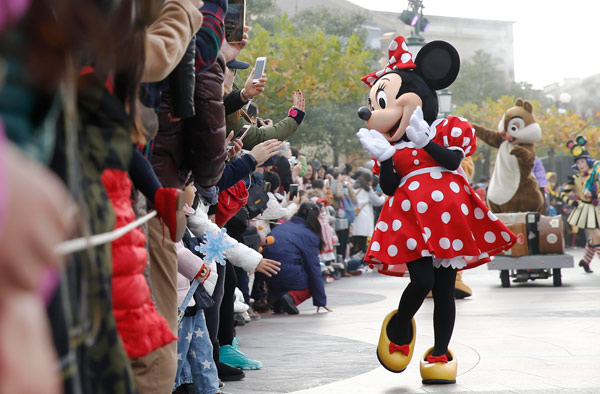Student sues Shanghai Disney over no-outside-food policy


In response to a lawsuit against its "no outside food and beverage" policy, Shanghai Disneyland said on Monday that the rule is "consistent with many other theme parks across China" and "guests are welcome to enjoy their own food and beverages outside the park".
The suit was brought by a law school student in Shanghai after she was told by park security to either throw away the snacks she had brought in her backpack or finish them. In order to get into the park, she discarded the snacks, which were worth 46.3 yuan ($6.60), following a series of failed attempts to resist, including oral disputes with security and phone calls to the police and to the municipal's official complaint hotlines, according to news portal thePaper.cn.
The student, surnamed Wang, a junior from East China University of Political Science and Law, made the trip to the park in late January and brought the case to the People's Court of Pudong New Area, where the theme park is located.
She called for the park's ban to be overturned and for the park to compensate her loss. The case was heard on April 23 and the verdict is pending.
Since being disclosed by a number of Chinese media over the weekend, the case has sparked heated discussions on social media about whether it is reasonable for the world's second largest Walt Disney park to deny visitors the right to bring their own food. Some argue that the food and beverages supplied within the park are overpriced, making the motivation behind the policy appear dubious.
In an online poll by local media shobserver.com, 40 percent of the respondents said they don't mind such a policy as long as there is no price difference between the food sold in and outside of the park. The poll attracted more than 3,000 people in less than six hours.
Shanghai Disneyland has banned outside food, alcohol and nonalcoholic beverages over 600 milliliters inside its park since November 2017, more than a year after its opening.
This is not the first time Shanghai Disneyland got sued over the policy. In June 2018, a lawyer from Suzhou, Jiangsu province, tried to take the theme park to court by accusing it of violating consumer rights. But the court turned down his appeal.
Wang, together with three of her classmates and a mentor, approached the case as a "service contract dispute", calling the ban an unfair term in standard-form consumer contracts. She also cited a statement by the Supreme Court, which said the policy of no outside food and beverages in the catering industry is a "bullying term", according to thePaper.cn.
In one of its recent school journals, Wang and her three classmates, who are all majoring in international law, said it's the nature of legal practitioners to find fault with the status quo.
In 2014, a college student in Yantai, Shandong province, won a lawsuit against a local cinema that prohibited him from bringing his own drink.
Globally, three out of the six Disneyland parks are open to food and drinks from beyond its services, while the three in Asia - Tokyo, Hong Kong and Shanghai - carry a no-outside-food-and-drink policy.
- Yuyuan Garden lights up with Year of the Snake lantern installations
- New dendrobium orchid species found in Sichuan
- People welcome the New Year across China
- China's railway trips expected to hit 11.5 million on New Year's Day
- Beijing: where ancient traditions meet modern marvels
- Beijing-Tianjin-Hebei 2025 celebrations shine at Zhengding county





































